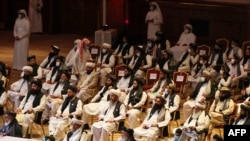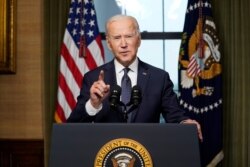Representatives of warring parties in Afghanistan are set to return to the negotiating table in Qatar this week to discuss, among other pressing issues, a de-escalation in Afghan violence as international forces continue to withdraw from the conflict-torn country.
Highly-placed official sources in neighboring Pakistan told VOA the Islamabad "brokered" peace meeting between the Taliban and Afghan government negotiators will begin Thursday in the Qatari capital, Doha.
Afghan officials have confirmed members of their negotiating team left Tuesday for Doha but they did not discuss when they will meet Taliban interlocutors.
Taliban spokesman Mohammad Naeem, who is based in the Qatari capital, told VOA that "no exact date has been set for the meeting yet" and maintained that the insurgent group "has always been ready to join the process whenever it begins."
The much-needed breakthrough in the stalled Afghan peace process comes amid reports the United States along with NATO allies intend to withdraw all their troops from Afghanistan by July 4, well ahead of the September 11 deadline announced by U.S. President Joe Biden.
The drawdown of the remaining estimated 2,500 U.S. troops and roughly 7,000 NATO partners began on May 1.
Officials in Washington have not commented on the media speculation, and the U.S. military estimated Tuesday it has "completed between 30%-44% of the entire retrograde process."
The reports of an early troop exit have worried Pakistani leaders as they repeatedly have called for an "orderly" military drawdown to prevent the turmoil-hit neighboring country from plunging into another round of civil war and bloodshed.
The continuation of Afghan fighting would undermine Pakistan's security and economic stability, according to officials in Islamabad. Prime Minister Imran Khan reiterated these concerns Monday.
"The prime minister underscored the importance of responsible withdrawal and steady progress by the Afghan parties towards a political solution," an official statement quoted Khan as saying in a phone conversation with leaders of the United Arab Emirates.
Officials in Pakistan, which already hosts nearly 3 million Afghan refugees, say they expect another influx of refugees unless the Afghan warring sides negotiate a peace deal to permanently end the war.
U.S. and allied troops are exiting Afghanistan after nearly 20 years of military involvement in the war-shattered country.
The drawdown stems from a peace-building agreement Washington signed with the Taliban in February 2020, which had required all foreign forces to leave the country by May 1 — before Biden revised the deadline citing logistical reasons.
In return, the Taliban have pledged to prevent international terrorist groups from using Afghan soil for attacks against the United States and its allies. The insurgents also launched peace negotiations last September with Afghan rivals in Doha but the process has been mostly deadlocked, with both sides blaming each other for blocking it.
Washington credits Islamabad with facilitating its negotiations with the Taliban and the ensuing intra-Afghan peace talks.
The Taliban have rejected calls for a cease-fire, however, or reducing violence until all foreign forces are out of Afghanistan. The increase in battlefield attacks in recent weeks has killed hundreds of combatants on both sides and Afghan civilians.
NATO's foreign and defense ministers were meeting Tuesday in Brussels to discuss, among other issues, winding up the military operations in Afghanistan and how to sustain support for Afghan forces battling the Taliban from somewhere outside the country. Providing safety to Western diplomatic missions and staff in Kabul is another key security challenge facing the alliance.






